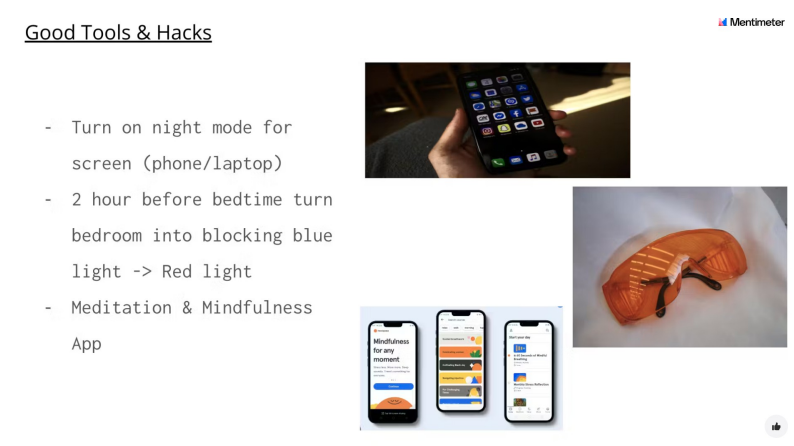While modern technology has brought many conveniences, it has also introduced new challenges that can disrupt our sleep quality. From the effects of excessive screen time to environmental factors like electromagnetic fields and hormonal imbalances, the third session of a recent webinar series addressed a variety of sleep disruptors and offered practical solutions for improving rest. 📱
The Role of Technology in Sleep Monitoring
One of the key topics discussed was the role of technology in both helping and hindering sleep. Devices like wearables, sleep trackers, and mobile apps can provide valuable insights into sleep patterns, helping individuals make data-driven decisions to improve their rest. However, when not used properly, technology can become a source of stress, further disrupting sleep.
Participants were introduced to the idea of a “tech curfew,” a practice that limits the use of screens and electronic devices before bed. Excessive exposure to blue light emitted by phones, tablets, and computers can interfere with melatonin production, the hormone responsible for regulating sleep. To mitigate this, experts recommended using night mode on devices or switching to red light in the bedroom, as red light has minimal impact on melatonin production.
While technology can provide helpful tools, it's crucial to strike a balance to avoid the negative effects of excessive tech use, especially before bedtime.

The Impact of Electromagnetic Fields (EMF) on Sleep
Another surprising topic that emerged during the session was the potential impact of electromagnetic fields (EMF) on sleep quality. EMF exposure—from Wi-Fi routers, mobile phones, home appliances, and other electronic devices—has been linked to sleep disturbances, increased restlessness, and daytime fatigue. While EMF is invisible and often overlooked, it may contribute to poor sleep, making it harder for some individuals to fall or stay asleep.
To combat this, participants were encouraged to take simple steps to reduce exposure to EMF. This includes unplugging electronic devices when they’re not in use, especially before bedtime, and keeping electronics like phones and laptops at a distance from the bed. In doing so, you can reduce the impact of “electro-pollution” and improve the quality of your sleep.
Hormonal Changes and Their Effect on Sleep
Hormonal imbalances are another significant sleep disruptor, particularly for men and women experiencing certain life changes. For men, low testosterone levels and cortisol imbalances can interfere with sleep cycles, leading to difficulty falling asleep or staying asleep. For women, hormonal shifts related to perimenopause and menopause can cause hot flashes, night sweats, and sleep disturbances.
The session emphasised the importance of tracking hormonal changes and seeking testing when necessary. Understanding the underlying hormonal influences on sleep can help individuals take steps to address them, such as adjusting lifestyle habits, managing stress levels, or even seeking medical advice to restore balance and improve sleep.
Sleep Apnoea: A Common but Often Undiagnosed Condition
Another critical sleep disruptor discussed was sleep apnoea, a condition where breathing repeatedly stops and starts during sleep. Many people with sleep apnoea remain undiagnosed because the signs—such as loud snoring, frequent waking during the night, or excessive daytime fatigue—are often overlooked or attributed to other causes. However, sleep apnoea can lead to serious health complications if left untreated, including heart disease, high blood pressure, and diabetes.
The session introduced the SLEEEP Apnoea STOP-BANG questionnaire, a simple screening tool that helps assess the risk of sleep apnoea based on symptoms and other factors. For those who suspect they may have sleep apnoea, this tool can help identify potential warning signs and encourage further evaluation. Early diagnosis and treatment are essential for preventing long-term health issues and improving sleep quality.

Parenting and Sleep Challenges
Parenting can also present unique challenges when it comes to sleep. Parents often struggle to balance the demands of childcare with getting enough rest themselves. From late-night feedings to waking up early for school runs, it can feel like sleep is always in short supply. During the session, experts shared strategies for managing sleep while juggling parenting responsibilities. This includes setting realistic expectations, practising good sleep hygiene, and making time for self-care whenever possible.
While it may not always be possible to get a full eight hours of sleep, small adjustments—like prioritising naps, creating a bedtime routine, or taking turns with a partner—can make a significant difference in managing sleep challenges and ensuring both parents and children get the rest they need.
Reclaiming Better Sleep
The final takeaway from the session was that while modern life presents many sleep challenges, there are solutions available. By being mindful of the impact of technology, reducing EMF exposure, understanding hormonal influences, and addressing conditions like sleep apnoea, individuals can take control of their sleep and make improvements.
If you're struggling with sleep, consider completing a sleep issues assessment to gain deeper insights into your habits and identify potential disruptors, so you can take sleep frenemies head-on.



